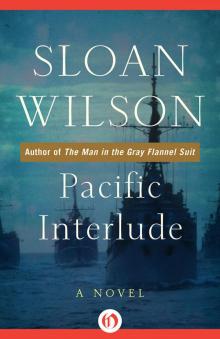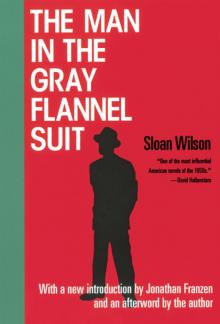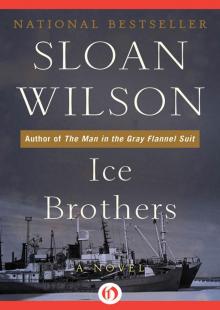- Home
- Sloan Wilson
Ice Brothers Page 27
Ice Brothers Read online
Page 27
Nathan knocked on the door. “The captain of the destroyer wants to know when we’re going to commence towing.”
“Right now,” Paul said, and went to the bridge. A long useless towing operation somehow seemed a logical next step for him.
For three days they continued to stand by the destroyer, keeping a strain on the towline much of the time. Finally a seaman got his hand smashed by the cable on the winch. He screamed while Nathan bandaged it, but immediately began to boast that he had his ticket back to the States. No one sympathized with him.
Paul used this incident as an excuse to stop towing and return to the base. When informed that an accident had happened, the captain of the destroyer signaled, “Return to base at will. Thanks for your help. Well done.”
The “well done” seemed rather ironic to Paul, but he was glad to see the last of that steel cable. He had no idea what he would do with Mowrey when he got back to the base, or what would happen if the old man turned him in for stealing the boat.
While they spent the day steaming up the fjord to the base, Mowrey slept in his cabin. When he learned that they would arrive within an hour, he drained the last of his bottles of triple sec, put on his best uniform and prepared to go to the officers’ club for some honest whiskey.
Once more the Arluk received orders to anchor in the fjord until room at a wharf could be found. Mowrey ordered the boat to be launched. When he curtly told Paul that he had to go ashore on official business, Paul wondered whether he meant the officers’ club or the office where he could turn his executive officer in for theft. There would be a certain Mowrey-like logic in getting rid of an executive officer, thereby making it impossible for himself to be transferred until a replacement was flown from the States.
Although Mowrey had scrubbed himself up and polished his shoes, he still looked terrible, and he stumbled on the corner of the hatch as he crossed the well deck toward the boat. I hope the son of a bitch falls and breaks his neck, Paul said to himself, a thought that would return to him because Mowrey never seemed to regain his equilibrium. Reeling from the hatch to the rail of the well deck, he started to climb into the boat. A brisk wind was making the usually quiet waters of the fjord choppy, and the whaleboat was dancing alongside.
“Goddamn it, hold that boat steady!” Mowrey roared. Then he fell. Boats and the seamen were unable to catch him. He slipped into the sea between the boat and the ship.
Paul had turned to go back to the wardroom. At first when he heard the shouting he thought that it was just part of the general hubbub which so often surrounded the skipper, but it was loud and excited enough to bring him running to the rail. Looking down, he saw both Boats and Mowrey in the water. Boats was trying to hold Mowrey up and the heavy whaleboat was pounding both of them.
“Cast off the boat!” Paul yelled. “Back it off!” Without making any conscious decision, he grabbed the end of one of the mooring lines which had been laid out and jumped over the rail. The water was so cold that it paralyzed his chest. When he got his first gulp of air, he grabbed hold of Mowrey’s parka and passed the line under his arms. Boats helped him to wrap it around and make it fast. “Heave away!” Paul yelled to the seamen on the deck, and miraculously Mowrey began to rise into the air. By that time Nathan was lowering a boarding ladder. Boats, whose face had turned blue, had to be helped up, but Paul somehow made it to the deck himself. The bitter wind plastered his wet clothes to his body and he ran for the wardroom where he rushed into a hot shower before bothering to undress. While he was drying himself, Nathan arrived with hot coffee and a glass of apricot brandy.
“The skipper’s alive,” he said.
“Am I supposed to cheer?”
“But he’s got some broken ribs and God knows what else. Flags has already told the base. They’re sending a doctor out.”
While trying to digest the full import of this information, Paul got into his bunk and covered himself with blankets. Despite the hot shower, his teeth were still chattering.
“I have an idea that that’s the end of Mowrey as far as we’re concerned,” Nathan said.
“Divine intervention.”
“What?”
“I never believed in it. Now I’m not so sure.”
“I don’t know if it was divine intervention or just a thousand gallons of booze, but I think he’s done.”
Nathan handed Paul the brandy and he sat up enough to drink it. His body was still trembling. A messenger came to the companionway.
“Mr. Green, a boat’s coming.”
Although he was still weak, Paul hurried into dry clothes. He got to the bridge in time to see Mowrey being loaded onto a stretcher, muttering and groaning, but saying nothing.
“I gave him a shot of morphine,” Nathan said.
Paul followed the stretcher bearers to the well deck. They put their burden down near the rail while they called for seamen to help lower it into their boat. Paul stood staring down into the still florid face of his captain. Suddenly Mowrey opened his red eyes and for a long moment stared back.
“You’re going to be okay, skipper,” Paul said.
Mowrey moved his lips and Paul had to kneel to catch his words. “Fuck you too, Yale!”
When Mowrey was loaded into the boat, the crew of the Arluk gathered on the well deck, their faces solemn. There wasn’t a man there he hadn’t abused nor a man whose life he hadn’t saved in the process of keeping the ship afloat. No one waved or joked or tried to say anything as Mowrey was lowered over the side.
After the boat had pulled away from the ship, Flags approached Paul. “Sir, should I put up the third repeater? I mean, is Mr. Mowrey still captain?”
“He’s still captain until someone else stands up here and reads orders changing the command.”
“Aye, aye, sir,” Flags said, and a moment later the little white pennant with the black stripe through its center climbed the signal mast to signify that the commanding officer was not aboard. Mowrey, if nothing else, had been a commanding officer, Paul reflected. Regardless of his weaknesses, his command had enabled a tiny fishboat with a crew of novices and hard cases from the Boston brigs to steam thousands of miles in the Arctic and to survive even when the old man himself could not. As this pennant, now trembling stiff in a rising wind, signified, the commanding officer now had gone. GreenPat might transfer Mowrey’s title to him, Paul thought, but it was too bad they couldn’t also transfer the old ice pilot’s knowledge, his sea sense. If, on receiving the empty title, he hauled down that pennant to announce that the commanding officer had returned, Paul felt he would be exercising a sort of deception. Maybe he should cut the pennant and fly half of it to signify that a half-ass commanding officer was aboard.
CHAPTER 25
Paul was still staring at the pennant when Nathan came up to him. “I’ve got a lump in my throat too,” he said with his wry grin, “but damn it, I’m glad the old bastard’s gone.”
“Yeah.”
“It was weird, how he kept calling me ‘Greenberg.’ You know, that really was my family name. My father changed it. I’ve often thought of changing it back, and now, damn it, I think I will—as soon as I get back to the States. Greenberg we were and Greenberg I’ll stay.”
“I think I can understand that. No matter what you call yourself, I hope you stay aboard here. With the old man gone, everything will be different.”
Before Nathan could reply, Boats came up to them. “Sir, the men are all crazy to see if we’ve got mail.”
“You want to go in and track down our mail, Mr. Greenberg?” Paul asked and allowed a smile.
“Sure. You coming?”
“I ought to go into Operations and do all sorts of things,” Paul said, rubbing his eyes. “The trouble is, I feel so goddamn tired, I can hardly stand up.”
“Can I report into Operations for you?”
“If you’re going to be exec, I guess you can start now.”
“I want to talk to you about that. Maybe we better wait till you’ve gotten
some rest.”
“No, we better get that settled. Operations will want to know. Let’s go to the wardroom.”
Seth was at the wardroom table beginning a long letter to his wife. Sensing a need for privacy, Paul said, “Let’s go to the bridge.”
Flags and a quartermaster were on the bridge. Without thinking about it at first, Paul went to the captain’s cabin and sat on Mowrey’s bunk while Nathan sat on the stool by the chart table.
“This has been a tough one for me,” Nathan said. “Damn it, I’d like to be exec. The fewer people I have over me to do a lot of yelling, the better. But …”
He paused, shrugged and looked embarrassed.
Paul’s hand hit something hard under the blankets and he drew out a bottle of blackberry cordial.
“Want a drink?”
“I could use one.”
“There should be a glass in the head.”
Nathan got one. Paul poured him a drink and took a swig from the bottle before replacing the cork.
“What I’m trying to say,” Nathan said after his first swallow, “is that we have to face facts. This ship has a tough assignment. You and the men deserve the best exec you can get. I can’t seem to lick the seasickness. I think I’ve learned a lot, but I still don’t know anywhere near enough for the job.”
Paul took another swig from the bottle. “Seasickness shouldn’t be too much of a problem,” he said. “You’ll get over it eventually, and anyway, we’ll be in ice practically all winter. And as for your not knowing enough, who does? If you won’t take the job, I won’t get some old salt to make second in command of a trawler. I’ll just get some boot ensign who knows less than you do and thinks he knows everything.”
“You mean, you really want me?”
“I think we work well together. Of course, I’m just assuming they’ll give me command. They may have some old mustang waiting.”
“God, I hope not. I don’t want to go through that again.”
“I don’t think you’re very smart to trust me. I don’t know much more than you do … We’re both crazy when you come right down to it.”
Nathan shrugged.
“I can’t get over how crazy we are,” Paul said after another swig. “I’ve been busting my ass to get command of this ship and you’ve been busting yours to learn everything you can. We’ve both been doing pretty well, and what’s the big prize? We get to take a fishboat to the east coast of Greenland, spend the winter in the ice and look for German ships which probably outgun us ten to one. I don’t know why I’m so hot for this. Why are you?”
“I don’t like the Germans,” Nathan said quietly. He was on the point of telling Paul about the disappearance of his wife in Poland, but somehow his throat always constricted before he could get the words out. Besides, how could he expect Paul to react? If he didn’t show enough shock and outrage, Nathan knew he would hate him, and what would be enough? No, Nathan thought, he probably would keep it to himself where it belonged … locked in him, like a series of explosions within an engine, it would drive him harder.
“If you want to fight,” Paul was saying, “this is a hell of a ship for it. God, I wish we could get radar! And they ought to be able to figure out a way to give us some kind of effective guns. They say the army is developing all kinds of light stuff for fighting tanks. You know, I bet that no one with half a brain has ever thought seriously about how to make a trawler a fighting ship. They don’t even give us hand grenades!”
“We could put in for radar again.”
“Ah, the Coast Guard is at the bottom of the navy priority list, and the trawlers are at the bottom of the Coast Guard list. This three-inch twenty-three they’ve given us is what they used to fight rum runners twenty years ago! It’s all a joke.”
“A bad one for Hansen.”
“Yeah, the Krauts were probably laughing like hell when he popped away at them.”
There was a moment of silence while they both drank.
“Still, there’s nothing wrong with the idea of sending small, expendable ships to spot the enemy for planes,” Nathan said. “If I were the captain of a Kraut weathership, I wouldn’t laugh at that.”
“Except in the fog, and it’s usually foggy up there.”
“In winter?”
“Then it will just be dark.”
“Couldn’t the planes operate in darkness if we spotted the target with star shells?”
“Yeah, we’d have more of a chance in darkness than fog,” Paul admitted. “If we spotted the enemy before he spotted us, we would radio his position and hide till the planes showed up. But what if he has radar and we don’t?”
“In the ice floe it would be hard for a radar operator to tell a ship from the bergs if the ship didn’t move.”
“But we’ve got to keep moving to find anything.”
“If we could detect his radar, it would be almost as good as having radar ourselves. We could just stop as soon as we knew he was picking us up. It’s not hard to make a radar detection device. If I could just get the materials and the tools—”
“We can try. There’ll be no legal way to do it. Maybe we can swap the damn boat …”
“I’ll go visit the base radar station and their radio headquarters. A radar detection unit is really nothing but a very high frequency radio. I could build one easy if I could get the right stuff.”
“Nathan, if you can fix it so we can pick up the Krauts before they pick us up … Concentrate on it, I’ll help, but I wouldn’t even know what to ask for.”
“I’ll do my best,” Nathan said.
“If we have to buy the stuff with cash, we probably could come up with a few grand … Do you want me to come ashore with you? I’m a goddamn good thief.”
“When I locate what I want, maybe I’ll need you. Get some rest, skipper.”
The title had come naturally to Nathan’s tongue, but it startled Paul.
“I’m not a goddamn skipper yet,” he said. “Our new Mowrey will probably come aboard any minute. Go get the mail for the guys, and after that forget everything but the materials and tools you need. Don’t sleep! General quarters is ringing for you right now. Break your ass. The time to start fighting is now, not when they start shooting at us—”
“Aye, aye, sir!” Nathan gave him an elaborate mock salute. Then moving his tall, ungainly body with surprising speed, he jumped down the steps to the well deck. There was new authority in his voice when he said, “All right, Boats, get me ashore! I got some work to do …”
After arranging to have the mail which had been accumulating for four months trucked to the whaleboat, Nathan decided to begin his mission at the office of the commander of the Greenland Patrol. It was, after all, usually best to begin at the top. If Commander GreenPat, whom Nathan had somehow begun to visualize as an elderly Irishman, understood the Arluk’s need for a radar detection device and Nathan’s ability to construct one, he should, if he were responsible, do all he could to get the necessary supplies. Beyond that, Nathan hoped to get some inkling of whether Paul was going to be given command of the ship. If the recommendation of another officer aboard the Arluk could help, he might even be able to influence that decision a little. Paul lacked Mowrey’s experience, but he was at least a man Nathan could deal with. Nathan had felt withered by Mowrey’s lethal combination of unreasoning contempt and righteous indignation at incompetence. Paul’s faith in him, the fact that Paul actually wanted him to serve as executive officer, had released him from a nightmare. If there was anything he could do to make sure that Paul, instead of another man like Mowrey, got command of the Arluk, Nathan wanted to give it his best shot.
Commander GreenPat and his staff occupied a Quonset hut not far from the officers’ club. A stout but immaculately uniformed lieutenant junior grade who had served twenty years as a chief yeoman looked at Nathan’s rumpled uniform and said, “You must be from one of the trawlers.”
“The Arluk, sir. We just got in.”
“Are you Paul Schuman?”
“Nathan Green, sir. I’m the communications officer. Mr. Schuman will be here later. He’s been on the bridge night and day for a long while.”
“I understand you’ve had a hard time. The commander will be glad to see you.”
Commander Sanders was not an old Irishman. A thin, middle-aged but careworn Yankee, he looked more like a scholar than a ship’s officer, and had in fact retired from the Coast Guard five years before the war to write a doctor’s thesis on polar ice and to teach at the University of Maine. He stood up behind his desk when Nathan entered his office and shook hands warmly.
“I have great admiration for you people on the trawlers,” he said. “In Maine they have an expression: small ships and big men.”
Since so many military people appeared to hold the trawlers in contempt, Nathan was surprised and pleased. He stopped worrying about his rumpled uniform and tarnished gold stripe.
“Thank you, sir,” he said. “Sometimes we don’t feel so big.”
The commander laughed, then quickly sobered. “I’m sorry to hear about Captain Mowrey. I just got an initial report from the base hospital. It’s not so good.”
“Captain Mowrey is a sick man, sir.”
“Yes, but he’s a real loss. I never felt I really had to worry about a ship when Mowrey was aboard. I know he gave his men plenty to worry about, but I didn’t have to worry about him the way I do lots of skippers.”
“Yes, sir.”
“I don’t know who we’re going to give the Arluk to. She has an important assignment and a difficult one. Mr. Schuman has only had about five months of sea duty.”
“But he’s very good, sir. I’m sure he can handle it.”
Commander Sanders smiled. “I’m glad to see he has the confidence of his communications officer.”
“Captain Mowrey gave him a very good fitness report, sir. The captain told me about it.”
“Mr. Schuman hasn’t even been in the service long enough to get a fitness report.”
“No, sir, but I think that Captain Mowrey may have known that his health wasn’t good. He made out fitness reports recently. They’ll be mailed to you—”

 A Summer Place
A Summer Place Pacific Interlude
Pacific Interlude Man in the Gray Flannel Suit
Man in the Gray Flannel Suit Ice Brothers
Ice Brothers